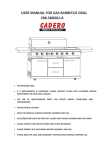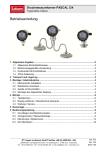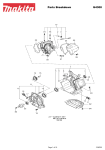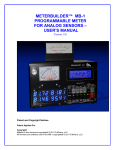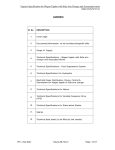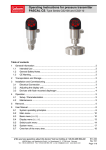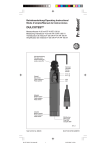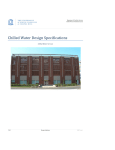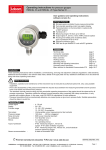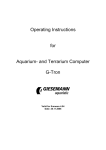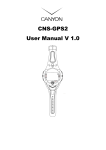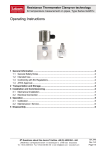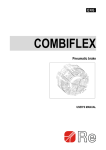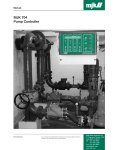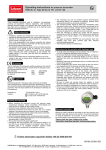Download Operating instr.
Transcript
Pressure transmitter PASCAL Ci4 Type series CI4xxx Operating Instructions 1 General Information....................................................................................................... 2 1.1 General Safety Notes .............................................................................................. 2 1.2 Intended Use ........................................................................................................... 2 1.3 Conformity with EU Regulations.............................................................................. 2 1.4 ATEX Approval........................................................................................................ 2 2 Transportation and Storage.......................................................................................... 2 3 Installation and Commissioning .................................................................................. 2 3.1 Mechanical Installation ............................................................................................ 3 3.2 Electrical Connection .............................................................................................. 3 3.3 Devices with Diaphragm Seal ................................................................................. 4 3.4 Mounting the Remote Display ................................................................................. 4 4 Operation........................................................................................................................ 5 4.1 Test Terminals ........................................................................................................ 5 4.2 Remove Display / Activate Write Protection ............................................................ 5 4.3 Maintenance / Service ............................................................................................. 6 5 Disassembly................................................................................................................... 7 6 User Manual ................................................................................................................... 8 6.1 Basics of the Operating Concept............................................................................. 8 6.2 Display Mode / Measured Value Display ................................................................. 9 6.3 Menue Mode / Operating Menue........................................................................... 13 6.4 The Menue Tree.................................................................................................... 16 Questions about this device? Hotline +49 (0) 4408 804 - 444 LABOM Mess- und Regeltechnik GmbH Im Gewerbepark 13 27798 Hude Deutschland Tel.: +49 (0) 4408 804-0 Fax: +49 (0) 4408 804-100 e-mail: [email protected] www.labom.com BA_072 Rev 1A5 Page 1/28 1 General Information This document contains necessary information for the proper installation and use of this device. In addition to this instruction, be sure to observe all statutory requirements, applicable standards, the additional technical specifications on the accompanying data sheet (see www.labom.com) as well as the specifications indicated on the type plate. 1.1 General Safety Notes The installation, set up, service or disassembly of this device must only be done by trained, qualified personnel using suitable equipment and authorized to do so. Warning Media can escape if unsuitable devices are used or if the installation is not correct. Danger of severe injury or damage Ensure that the device is suitable for the process and undamaged. 1.2 Intended Use The device is intended to measure pressure of gases, vapors and liquids as specified in the data sheet. 1.3 Conformity with EU Regulations The CE-marking on the device certifies its compliance with the applicable EU Directives for placing products on the market within the European Union. The following guidelines apply to these devices: ATEX Directive 94/9/EC EMC Directive 2004/108/EC PED Directive 97/23/EC You find the complete EC Declaration of Conformity (document no. KE_042) at www.labom.com. 1.4 ATEX Approval If you purchased a device with ATEX approval, please refer to the accompanying document XA_010 or XA_011 for ATEX-relevant information. 2 Transportation and Storage Store and transport the device only under clean and dry conditions preferably in the original packaging. Avoid exposure to shocks and excessive vibrations. Permissible storage temperature: 3 -40…80 °C Installation and Commissioning Ensure that the device is suitable for the intended application with respect to pressure range, overpressure limit, media compatibility, temperature range and process connection. After the mechanical installation and electrical connection is completed, the device is ready for operation as soon as the power supply is switched on. BA_072 Rev 1A5 Pressure transmitter PASCAL Ci4 Page 2/28 3.1 Mechanical Installation Use gaskets, if required, that are suitable for the process connection and resistant to the media. Before starting operation, check the process connection carefully for leaks under pressure. You can use the device in any mounting position. Normally the transmitter is adjusted for a vertical mounting position. A different mounting position in combination with a small nominal range might cause a zero point offset. In this case a zero point adjustment might be necessary. 3.2 Electrical Connection Complete the mechanical installation before you connect the device electrically. Set up all electrical connections while the voltage supply is switched off. Output (2-wire) Permissible supply voltage Permissible load 4...20 mA (20...4 mA) UV = 12…30 VDC RB ≤ (UV - 12 V) / 22 mA Circular connector M12 ( ) (-) (+) n.c. Cable gland 12...30 V 0V Bild 1: Options for the electrical connection Observe the following points regarding for electrical connections via cable gland and terminal block: − Do not forget to tighten the cable gland after the electrical connection is finalised. − Press down the spring of spring-operated terminals as far as possible, e.g. with a screwdriver, before you insert the cable. Otherwise a safe electrical connection cannot be ensured. BA_072 Rev 1A5 Pressure transmitter PASCAL Ci4 Page 3/28 3.3 Devices with Diaphragm Seal Remove the protective cap or protective wrapping from the diaphragm only just before installation to prevent contamination or damage. The diaphragm must not be touched. Do not place the device on its diaphragm. Even small scratches or deformations may negatively influence the zero point or other characteristics of the device. Pressure transmitter and diaphragm seal are a closed system that must not be separated. You can find further information about diaphragm seals in the document TA_031 on www.labom.com. 3.4 Mounting the Remote Display Optionally you can mount the display and control unit up to 10 m away from the measuring point in an additional housing. The back plate of the housing is universally suitable for wall mounting or pipe mounting for pipe diameters from 30 – 64 mm. For pipe mounting, you can order the corresponding U-bolts from LABOM. For best EMC protection, only use the included cable. If you ordered the remote display together with the device, the assembly has been completed in the factory. You only need to route the cable and mount the housing with the remote display. If you have received the remote display as a retrofit kit, proceed as follows: 1. Unmount the front cover and the display unit from the PASCAL Ci4 (see 4.2). 2. Replace them with the adapter piece (round part with M12 socket) and front cover, which were screwed onto the remote display housing for shipment. Do not forget to connect the cable on the back with the display connector on the CPU module. 3. The cable may be shortened to on-site requirements. Colour codes on the terminals indicate which wire should be connected to which terminal (see Figure 2). 4. Mount the remote display housing using the mounting holes to a wall, a pipe or another suitable location. 5. Plug the M12 connector of the cable into the socket of the adapter piece. 6. Now connect the cable on the display module with the corresponding connector on the terminal board in the remote housing and insert the display module in the same manner as for the device itself (see 4.2). 7. The last step is to close the remote housing with the display cover that was previously on the device. 1_BN/BR 2_WH/WS 3_BU/BL Colour codes BN/BR: Brown WH/WS: White BU/BL: Blue BK/SW: Black 4_BK/SW Figure 2: Connection of the remote display housing BA_072 Rev 1A5 Pressure transmitter PASCAL Ci4 Page 4/28 This modification can be performed during operation. We do recommend, however, to switch off the device during the modification. max. 10 m Figure 3: Remote display and control unit after installation 4 Operation During operation, take care that the device remains within its intended pressure and temperature ranges. No other monitoring is necessary. Permissibe ambient temperature: 4.1 -40…80 °C Test Terminals You can check the output current without interrupting the current loop, using the test terminals on the terminal board. When you connect a current meter to the "+Test" and "Test" terminals, the current is automatically routed through it. A Figure 4: Current measurement during operation using test terminals 4.2 Remove Display / Activate Write Protection Using the DIP switch in the device, you can disable changes to the configuration via the display or via HART. To activate the write protection, you must first remove the display module. Proceed as follows: − Unscrew the front cover − Turn the display module 20° counterclockwise − Lift off the display module carefully BA_072 Rev 1A5 Pressure transmitter PASCAL Ci4 Page 5/28 unscrew front cover turn display module 20° remove display module Figure 5: Removing the display After removing the display module you can reach the DIP switch on the CPU module. The write protection is active when the DIP switch is in the "ON" position. position write protection „ON“ position write protection „OFF“ Figure 6: Write protection via slide switch in the device Re-mount the display module in the reverse order. 4.3 Maintenance / Service When properly installed in accordance with applicable specifications, this device is maintenance-free. However, we recommend an annual recalibration of the device. In case of damage or defects, the customer can replace the following elements: − Display module − Cable glands (if applicable) For defects to other components, repairs must be performed in the factory. BA_072 Rev 1A5 Pressure transmitter PASCAL Ci4 Page 6/28 5 Disassembly When measuring hot media, make sure that the device has cooled down prior to any dismounting or wear appropriate protective clothing to avoid burns. Switch off the power supply to the device before disconnecting the electrical connections. Once this is done, the device may be mechanically removed. Warning Opening pressurized lines might cause severe injuries. Danger of severe injuries or damage Relieve the process pressure before attempting to remove the device. Shut off the pressure supply for all feed lines to the device and relieve the pressure in them. Warning Hazardous deposits and residues might remain on opened process connections and removed devices. Danger of injury After the device has been removed, seal off the measuring point and mark the open process connection accordingly. Consider a possible danger due to residues when handling the removed device. BA_072 Rev 1A5 Pressure transmitter PASCAL Ci4 Page 7/28 6 User Manual The device can be configured via the display module as well as the HART protocol. The following pages describe operation and configuration of the device using the display module. An overview of the menue structure can be found on the last page of this document. 6.1 Basics of the Operating Concept The display module consists of a dot-matrix display with 80x120 pixels as well as a 4-button control panel. The four buttons below the display allow an intuitive operation of the device. The general functionality of the buttons is identical in all operating modes. Figure 7: Control elements If you press and hold the up or down button, it will automatically be triggered multiple times. This allows to easily navigate through longer selection lists. If you press and hold the ESC button, you always return to the measured value display. Button / Function Select function, increase/decrease value OK Confirm selected function or selected value ESC Cancel action ESC long Return to measured value display Table 1: General button functions The structure of the display is the same in every operating mode. The display area is divided into four zones: − − − − Header Icon indicating device status Data area Bar graph related to the currently measured value BA_072 Rev 1A5 Pressure transmitter PASCAL Ci4 Page 8/28 Header Icon Data area Bar graph of measured value Figure 8: Display Structure The icon for the device status (see 6.2.3) as well as the bar graph is displayed in each operating mode. The bar graph always shows the measured pressure value in per cent of the pre-set measuring range. The contents of the header and the data area depend on the operating mode: Display of measured value − Header: Icon description, if applicable. Otherwise "Value" − Data area: Measured values and parameters according to the selected display mode (see 6.2.4) Display of device data (see 6.2.1) − Header: Title for the displayed device data − Data area: Device data Operating menue − Header: Selected menue item − Data area: Submenue or dialogue during setting procedure 6.2 Display Mode / Measured Value Display After applying the supply voltage and completion of the initialisation, the device switches to the display mode. In the display, the currently measured value is shown. If the measured value is larger than the displayable number due to setting a fixed decimal point, the largest displayable number is shown flashing. BA_072 Rev 1A5 Pressure transmitter PASCAL Ci4 Page 9/28 6.2.1 Quick Access to Device Data You can access a number of device parameters directly from the measured value display using the / -buttons. This allows a quick overview of the device configuration. With the -button you can display variable data (trailing pointers and counters), with the -button static information such as configuration data. From any screen of the device data, you can enter the operating menue with OK and go back to the measured value display by pressing ESC. The sequence of the screens with device data is as follows: − Counter (operating hour counter, maintenance timer) Trailing pointer (pressure and sensor temperature) − − ----- Measured value display (starting point) --− Pressure measurement (rel/abs, nominal range, measuring range, damping) − Current output (characteristic curve, alarm current, limits) − HART data (address, tag, descriptor, date) − Device identification (device ID, order number, serial number) − Module information (hardware and software versions, serial numbers) 6.2.2 Locking the Menue You can lock the menue with a key combination at the device. Press and hold the ESCkey and press then OK to activate the menue lock. You can still access the device data but the menue is now locked. An active menue lock is indicated by the header text „Menue locked“ in combination with the lock icon. Use the same key combination to unlock the menu again. The menu cannot be unlocked with the key combination if the hardware DIP-switch is aktivated. Button / Function Scroll through the pages with device data OK Go to the operating menue ESC Return to measured value display ESC+OK Activate / deactivate menue lock Table 2: Button functions in display mode BA_072 Rev 1A5 Pressure transmitter PASCAL Ci4 Page 10/28 6.2.3 Icons indicating device status In the top right corner of the display, depending on the device status an NE107-conform icon is displayed. The following icons are defined: Error/failure Critical error, alarm current is activated The error description is indicated in the display. The operating menue can still be opened. Warning Temperature or pressure limits are exceeded. Saturation The output current has reached the pre-set upper or lower current limit. Function control The output current corresponds to the pressure or current simulation, but not to the applied pressure value. Maintenance The device indicates necessary maintenance due to maintenance timer settings (see 6.4.7.2). Write protection The write protection of the device was activated via the DIP switch or with the key combination in the display. Table 3: Icons for device state The list of icons is sorted in descending priority. Only the icon with the highest priority is shown. The two most important icons for fault and/or warning are flashing when displayed. BA_072 Rev 1A5 Pressure transmitter PASCAL Ci4 Page 11/28 6.2.4 Display layouts You can configure the layout of the measured value display as well as the displayed information individually. There are five different layouts available: Designation Five values Layout Description 1st value Under the main value, four additional values are shown. 2nd value 4th value Four values 3rd value 5th value 1st value 2nd value 3rd value 4th value Three values 1st value 2nd value 3rd value Two values 1st value Example Under the main value, three additional values are shown. One of these can use the entire display width. Under the main value, two additional values are shown. Both of them can use the entire display width. Two values are shown in the same size, one under the other. 2nd value Large display 1st value 2nd value unit The main value is shown at the maximum size (best readability from a distance). One additional value can also be shown. Table 4: Display layouts You can define what information shall be shown in the layout’s placeholders. You can select the 1st value (main value) from the following data: 1. 2. 3. 4. Pressure with the selected unit Pressure in per cent of the measuring range Pressure in milliampere of the output signal Sensor temperature For all further values, you can additionally choose from the following data: − Device ID (see 6.4.10.1) − HART tag − HART descriptor When information (such as the device ID) cannot be displayed in a short layout placeholder, "###" appears on the screen. Then select another layout or assign the value to a longer layout placeholder. You can configure the display mode in the operating menue (see 6.4.4.3). BA_072 Rev 1A5 Pressure transmitter PASCAL Ci4 Page 12/28 6.3 Menue Mode / Operating Menue Press OK in the measured value display to go to the operating menue. Then the main menue appears in the display. In the operating menue you can navigate in the menus by using the arrow buttons. The selected menue item is indicated by triangles on the left and right. The OK button selects the menue item or switches to the corresponding submenue. You can return to the higherlevel menue by pressing ESC. From the main menue, pressing ESC returns to the measured value display. From every position in the operating menue, you can return to the measured value display by pressing and holding the ESC button (for at least one second). OK ESC OK ESC ESC ESC long Figure 9: The Operating menue In long menus and selection lists, a scroll bar on the left side shows the position of the currently selected item. Menue items that open a setting dialogue differ from submenus by three trailing points, e.g. "Lower range …" (setting dialogue) and "System" (submenue). If no button is pressed in menue mode for five minutes, the device automatically returns to the display mode without saving any values. Button Function Scroll up in the menue, increase value/position in list Scroll down in the menue, decrease value/position in list OK Select menue, confirm value/list entry ESC Cancel the data entry or menue selection, return to the next higher menue ESC long Cancel menue mode, return to display mode Table 5: Button functions in the operating menue Numeric values and selection lists are handled differently, when entering parameters. BA_072 Rev 1A5 Pressure transmitter PASCAL Ci4 Page 13/28 6.3.1 Selection of a value from a selection list When opening a selection list, the currently set value is shown above the selection list. Up to three entries are shown at the same time. When the selection list is longer, a scroll bar on the left side of the display indicates the position of the selected item in the selection list. set value scroll bar for orientation in long selection lists selection list Figure 10: Elements of a selection list When you press the ESC button, you cancel the entry and go back to the menue entry. The selected value is not saved. With the OK button, the selected value is saved. Saving the value is confirmed with an information window (see below) and the new value is shown above the selection list. With ESC, you leave the selection list after saving. If you press and hold the ESC button, you go back to the display mode. OK ESC ESC OK ESC ESC long Figure 11: Procedure for value selection (e.g. conversion from mbar to bar) BA_072 Rev 1A5 Pressure transmitter PASCAL Ci4 Page 14/28 6.3.2 Setting a numeric value When setting numeric values, the screen shows the following elements (from top to bottom): − − − − − Description of the parameter that can be set Help text Numeric value Unit Bargraph parameter designation help text numeric value unit bar graph Figure 12 Elements when setting a numeric value After selecting a menue item for numerical entry (e.g. upper range value), at first the value is only displayed. The numeric value itself is shown in square brackets and its the unit below. Unused leading digits are marked with bottom lines. You need to press OK again to enter the edit mode. Numeric values are entered digit by digit. First, always the leftmost digit is selected (visible with two triangles above and below the number). By pressing OK, you go to the next digit. You change the selected digit by pressing the or button. The higher value digit is also increased or decreased when passing zero. For instance, you can easily go from 19 to 20 without having to edit two digits. Lower value digits are not influenced, unless the parameter limit is reached. The value is then set to the parameter limit. You can set negative numbers by reducing the leftmost digit below zero. When you press the ESC button, you can cancel the entry at any time and return to the display of the set value. Any change of the value is not saved. With the OK button you confirm the set digit value and jump to the next digit. When you confirm the rightmost digit, the entire value is saved. You can save the new value from any digit by pressing and holding the OK button. BA_072 Rev 1A5 Pressure transmitter PASCAL Ci4 Page 15/28 OK OK OK long Figure 13: Procedure for number entry (e.g. changing from 4.0000 to 2.9000) 6.4 The Menue Tree In the following, the display and adjustment options are described by their position in the menue tree. An overview of the menue tree can be found on the last page of this document. 6.4.1 Main menue The main menue has the following entries: Menue entry Description Quick setup Selection of the most important settings Adjustment Adjustment functions for pressure measurement and current output Display Functions for configuring the display Measurement Configuration of the pressure measurement Current output Configuration of the current output Diagnosis Diagnostic information such as trailing pointers, etc. Simulation Simulation of pressure and current for function check of the measurement chain Communication Information and settings regarding HART communication System Device data and function such as factory reset Table 6: The main menue BA_072 Rev 1A5 Pressure transmitter PASCAL Ci4 Page 16/28 6.4.2 "Quick Setup" menue In Quick Setup, basic configuration options are combined to make it possible to quickly configure key functions. All functions of the quick setup can also be found at another position in the menue tree. The following functions are available in the Quick Setup menue: Menue entry Description Sprache/Language Select menue language (German or English) Unit Pressure Select unit for measured pressure (see 6.4.4.1) Unit Temperature Select unit for sensor temperature (see 6.4.4.2) Lower Range Value Setting of the pressure value that should correspond to 4 mA (start of range) (see 6.4.5.1) Upper Range Value Setting of the pressure value that should correspond to 20 mA (end of range) (see 6.4.5.1) Damping Setting the damping of the output signal (see 6.4.5.2) Device ID Setting the device ID (see 6.4.10.1) Config.-memory Configuration memory: reading, writing and status (see 6.4.10.3) Table 7: "Quick Setup" menue 6.4.3 "Adjustment" menue The following functions are available for the pressure adjustment: Menue entry Description Zero Point Set device at ambient pressure to zero (0 bar rel) (only for devices measuring gauge pressure) Position Correction Correct zero point error due to installation position (only for devices measuring gauge pressure) Lower Adjustment Offset correction with applied reference pressure Upper Adjustment Span correction with applied reference pressure Table 8: "Pressure Adjustment" menue 6.4.3.1 Zero-point correction The zero-point correction requires a non-pressurized pressure port e.g. during calibration in the lab. When executing this function the applied pressure will be interpreted as zero bar relative pressure. The zero point correction results in an offset of the whole characteristic curve. Therefore it is a special case of the lower adjustment (see below). BA_072 Rev 1A5 Pressure transmitter PASCAL Ci4 Page 17/28 6.4.3.2 Position correction Using the function "Position Correction", you can correct the offset error due to the installation position independent of the zero-point offset. In the corresponding submenue, you will find the following entries: Menue entry Description Pos.Corr. On/Off Activate/deactivate position correction Set Pos. Corr. Correct position error at ambient pressure Table 9: "Position Correction" submenue When you set the position correction, it will be activated automatically. You can deactivate the position correction, for instance for a subsequent calibration to check the zero point independently from the installation position. 6.4.3.3 Upper and lower adjustment The lower adjustment results in an offset of the characteristic curve. It thus affects zero and span of the measuring range. The upper adjustment changes the slope of the characteristic curve by correcting the span of the measuring range. Execute the lower adjustment prior to the upper adjustment for a correct full adjustment. measured pressure 1) misaligned characteristic curve URV 2) characteristic curve after lower calibration (offset shift) 3) characteristic curve after upper calibration (span correction) LRV LRV URV true pressure Figure 14: Effect of the upper and lower adjustment on the characteristic curve You can perform the upper and lower adjustment at any reference pressure level. For instance, you can perform the lower adjustment of a -1…4 bar device at -900 mbar rel. The reference pressure level for the upper offset can also be freely chosen. For an exact adjustment, however, it should be as close to the upper range value as possible. BA_072 Rev 1A5 Pressure transmitter PASCAL Ci4 Page 18/28 6.4.3.4 Current adjustment You can use the current adjustment, if the reading at the end of the measurement chain does not correspond to the measured pressure. With this function you can compensate deviations in the output stage as well as the downstream measurement chain. Proceed as follows (example for 4 mA): − Select function "Current adjustment" –> "4mA" − Use "OK" to activate constant current mode (4 mA). CAUTION! The output current value now no longer corresponds with the measured pressure! This is indicated by the icon "Function check" (see 6.2.3) − Read the displayed current value at the end of the measurement chain. − Enter this current value (e.g. 3.996) at the device. The device now corrects the current output so that 4 mA are shown at the end of the measurement chain. When leaving the function, the constant current mode is disabled and the current value corresponds again to the measured pressure. 6.4.4 "Display" menue In the "Display" menue, you find all the settings that affect the display on the screen. Menue entry Description Language Select menue language (German or English) Unit Pressure Select unit for measured pressure Unit Temperature Select unit for sensor temperature Display Mode Configuration of the display layout and content (see 6.2.4) Decimal point Selection of the decimal places by specifying the decimal point Backlight Switch backlight on/off Table 10: "Display" menue 6.4.4.1 "Unit Pressure" submenue The unit in which the measured pressure is to be shown can be selected from the following list: Unit Description mbar Millibar (1 mbar = 0.001 bar) bar Bar (1 bar = 1000 mbar = 105 Pa) Pa Pascal (1 Pa = 1 kg/(m*s2) = 10-5 bar = 0.01 mbar) hPa Hectopascal (1 hPa = 100 Pa = 1 mbar) kPa Kilopascal (1 kPa = 1,000 Pa = 10 mbar) MPa Megapascal (1 MPa = 1,000,000 Pa = 10 bar) g/cm2 Gram per square centimetre (1 g/cm2 = 0.981 mbar) kg/cm2 Kilogram per square centimetre (1 kg/cm2 = 0.981 bar) psi Pound force per square inch (1 psi = 68.9 mbar) BA_072 Rev 1A5 Pressure transmitter PASCAL Ci4 Page 19/28 Unit Description atm Atmospheric pressure (1 atm = 1013 mbar) mmH2O Millimetre water column (1 mmH2O = 0.0981 mbar) mH2O Metre water column (1 mH2O = 98.1 mbar) inH2O Inch water column (1 inH2O = 2.49 mbar) ftH2O Foot water column (1 ftH2O = 29.84 mbar) torr Torr (1 Torr = 1 mmHg = 1.33 mbar) mmHg Millimetre mercury column (1 mmHg = 1.33 mbar) inHg Inch mercury column (1 inHg = 33.86 mbar) Table 11: Possible units for pressure The shown conversions are only meant for your orientation. The device uses conversion values with ten decimal places. Please note that units can only be selected for nominal ranges that the device can display. For instance, the unit Pascal is hidden for nominal ranges above 1 bar. The unit selection in this submenue only affects the display on the screen. Communication via HART is performed using the unit set in the HART driver. 6.4.4.2 "Unit Temperature" submenue The unit in which the sensor temperature is to be shown can be selected from the following list: Unit Description °C Degree Celsius °F Degree Fahrenheit ( TFahrenheit = TCelsius*1.8 + 32 ) °R Degree Rankine ( TRankine = TKelvin*1.8 ) K Kelvin ( TKelvin = TCelsius + 273.15 ) Table 12: Possible units for temperature 6.4.4.3 "Display Mode" submenue In the "Display Mode" submenue, you configure the representation of the measured values and additional information on the display. With the menue item “Screen Layout” you configure the information that is displayed and its layout. Up to five values can be displayed at the same time. In the additional menue entries "1st value" to "5th value" you define the contents of the placeholders in the layout. The various layouts as well as the possible content of the values are described in Chapter 6.2.4. BA_072 Rev 1A5 Pressure transmitter PASCAL Ci4 Page 20/28 6.4.5 "Measurement" menue In the "Measurement" menue, you configure the pressure measurement. Menue entry Description Lower Range Value Setting of the pressure value that shall correspond to 4 mA (start of range) Upper Range Value Setting of the pressure value that shall correspond to 20 mA (end of range) Damping Setting the damping of the output signal Measuring rate Setting of the measuring rate (20 or 100 Hz) Table 13: "Measurement" menue 6.4.5.1 Setting the measurement range You can freely set the lower and upper range value within the nominal range of the device, as long as the set range is not smaller than 1% of the nominal range (turndown 100:1). Please note that when the turndown is increased, the measurement error also increases. If you use a very small range you must therefore accept a significant measurement error. We recommended a maximum turndown of 10:1. The lower range value must be below the upper range value. For an inverse characteristic curve, select the setting "inverse" under "Current output" -> "Output Function" (see 6.4.6). 6.4.5.2 Setting the damping Using an adjustable damping you can eliminate fast pressure changes or peaks from having direct influence to the output signal. The set value in seconds corresponds to the of an exponential rise. After a suddon pressure change, it takes the time constant damping time to reach 63.2% of the actual pressure at the output. After the damping time has elapsed three times, 95% of the pressure is reached. actual pressure 100,0% 95,0% pressure value at current output due to damping 63,2% 0,0% 0 1 2 3 4 5 τ Figure 15: Damping effect BA_072 Rev 1A5 Pressure transmitter PASCAL Ci4 Page 21/28 The damping affects the current output as well as the displayed pressure value. 6.4.5.3 Setting of the measuring rate When shipped, the transmitter is set to a measuring rate of 20 Hz, i.e. 20 times per second the pressure is measured and the current is calculated and imprinted in the current loop. When a particularly fast measuring rate is required, for instance to detect pressure peaks, you can increase the measuring rate to 100 Hz. This can lead to the following restrictions: − Communication via HART can be disturbed by fast pressure changes. − The measuring signal can be noisier. For this reason, you should only increase the measuring rate to 100 Hz if necessary for the application. 6.4.6 "Current Output" menue In the "Current Output" menue, you configure all aspects of the current loop. Menue entry Description Output function Setting the output function (linear, inverse, square root, table) Table Specifying the interpolation points for the table function Alarm current Selection of the alarm current: High (>21 mA) or low (<3.6 mA) Lower current limit Limit of the lower output current (3.8…4.0 mA) Upper current limit Limit of the upper output current (20…21 mA) Table 14: "Current Output" menue Independent from the setting of the upper and lower current limit, the set measuring range always corresponds to a current range of 4..20 mA. 6.4.6.1 Configuration of the table function With the table function you can realise any output function. E.g. you can convert the fill height to the fill quantity depending on the tank shape. You can use up to 64 interpolation points for this purpose. Menue entry Description Number of Points Number of interpolation points Table values Combination of pressure in per cent and corresponding current value that are used as interpolation points of the table function Table 15: "Output Table" submenue You can only edit the table points when the table function is not active. You may need to set the output function to "linear", for instance (see above) before editing table points. The table points must be sorted according to ascending pressure. For instance, the 20% point may not be before the 10% point. Otherwise you cannot activate the table function. If the first table point is set above 0%, the output of the actual current will not change before the pre-set value of the first table point is reached. Until then, only the value of the first table point will be output. If, for instance, the first table point is set to 10% and 5 mA, the device outputs 5 mA from 0-10% of the set measuring range. The same applies when the last table point is not at 100%. BA_072 Rev 1A5 Pressure transmitter PASCAL Ci4 Page 22/28 With the and buttons, you can scroll through the table points and look at the combinations of pressure in per cent and current in mA. With OK, you switch to the edit mode for the displayed table point. Now enter the first per cent value and then the current value. When you confirm the current value, you return to the display of the table point you just edited. OK OK long OK long Figure 16: Changing a table point 6.4.6.2 Upper and lower current limit In the standard setting, the current output is limited at 3.8 and 20.5 mA, meaning a further drop or rise in the pressure does not change the current. You can freely select these current limits for the lower limit between 3.8 and 4 mA and for the upper limit between 20 and 21 mA. 6.4.7 "Diagnosis" menue In this menue you can view and configure various diagnostic information. The following diagnostic functions are available: Menue entry Description Counter Display of operating hour counter and maintenance timer Min/max Pressure Display and reset of trailing pointer for the pressure measurement Min/max Temp Display and reset of trailing pointer for the sensor temperature Last Error Display and reset of the last critical error Self Test Self test of the device like after applying the power supply Maintenance Timer Management of maintenance intervals Table 16: "Diagnosis" menue BA_072 Rev 1A5 Pressure transmitter PASCAL Ci4 Page 23/28 6.4.7.1 The trailing pointers The trailing pointers save the maximum and minimum measured pressure and temperature levels until they are reset by the user. The menue item that shows the trailing pointer, can also be used to reset it. The trailing pointers are also accessible directly from the measured value display in the device data (see 6.2.1). OK OK Figure 17: Display and resetting of the trailing pointer for pressure 6.4.7.2 The maintenance timer Using the maintenance timer, the device can signal the need for maintenance after a freely selectable number of operating hours. The timer counts down from the start value. Maintenance need is indicated by an icon in the display (see 6.2.3) and, if necessary, the HART protocol. When the maintenance timer has expired, the counter continues into the minus range thus the degree to which the interval has been exceeded is also visible. Menue entry Description State Displaying and stopping the maintenance timer Set Interval Setting and starting the maintenance timer Table 17: "Maintenance timer" submenue 6.4.8 "Simulation" menue In the "Simulation" menue, you can simulate the pressure as well as the current to test the subsequent measuring chain. Menue entry Description Current simulation Setting a fixed current value Pressure simulation Setting a fixed pressure value Table 18: "Simulation" menue The current simulation influences only the current output. The pressure simulation takes all settings into consideration, including the damping and an active table function. BA_072 Rev 1A5 Pressure transmitter PASCAL Ci4 Page 24/28 6.4.9 "Communication" menue In the "Communication" menue the settings for the HART communication are summarised. Menue entry Description HART address Setting the HART address for device identification in multi-drop mode Current mode Setting the current mode (proportional/constant) HART data Display of HART information (HART tag, HART descriptor, etc.) Send-preambles Setting of the communication number of send-preambles for HART Table 19: "Communication" menue 6.4.9.1 HART address This address corresponds with the short address which is used for the HARTCommunication. It can be set within a range of 0 to 63. Please note, that setting the short address between 1 and 63 will not automatically activate the constant current mode. This must be done under the menue “Current mode” (see 6.4.9.2). 6.4.9.2 Current mode The current mode determines whether the output current of the device is set to respond proportionally to the pressure (selection “proportional”) or whether it should remain constant at 4 mA (selection “constant”). When the current mode “constant” is in use the measurement value can only be read using HART (e.g. for HART-multidrop-operation). 6.4.10 "System" menue In the "System" menue, device-relevant functions are summarised. Menue entry Description Device ID Setting the device ID (e.g. to display a free-text in the display) Device data Display of device data (such as from measured value display) Factory data reset Reset to factory settings Restart Restarting the device (such as after a power outage) Config.-memory Configuration memory: reading, writing and status Table 20: "System" menue 6.4.10.1 Device ID Using the device ID, you can show a custom text in the display if you configure the display mode accordingly (see 6.2.4). For instance, you can show the tag number continuously in the display. The device ID can be up to 16 characters long and consist of numbers, empty spaces, capital letters and special characters. For the selection, the characters are arranged in the order shown below. From the end of the list (special character "@"), you are automatically guided back to the start (number "0"). BA_072 Rev 1A5 Pressure transmitter PASCAL Ci4 Page 25/28 Character set: 0123456789 ABCDEFGHIJKLMNOPQRSTUVWXYZ[\]^_!“#$%&‘()*+,-./:;<=>?@ 6.4.10.2 Factory reset When carrying out a factory reset, all parameters are set to the state at the time of delivery. This also includes the pressure and current adjustment. Exceptions are the following operational parameters: “trailing pointers”, “change counter” and “operation hours”. 6.4.10.3 Configuration memory Starting with software version 1.2.0 of the display module you can store all device parameters in the configuration memory of the display module. You can transfer the data back to the device or to another device. Transferring a configuration to another device requires a compatible target device. The same nominal range is not necessary. It is sufficient if the measuring range of the stored configuration is equal or smaller than the nominal range of the target device. The configuration memory contains the parameter setting of the device at the time of storage. If you change a device parameter afterwards, the stored configuration will not be updated automatically. The status screen of the configuration memory contains the following information: - Available YES: the display module contains a stored configuration NO: no stored configuration - Source this device: the stored configuration originates from the connected device Serial#: the stored configuration originates from the device with the listed serial number. - Up-to-date YES: The device configuration has not been changed since the parameter set has been stored in the display module NO: The device configuration has been changed The transfer of a configuration takes approx. 25 seconds. If you use a table function with many support points the transfer can take up to 50 seconds. BA_072 Rev 1A5 Pressure transmitter PASCAL Ci4 Page 26/28 BA_072 Rev 1A5 Pressure transmitter PASCAL Ci4 Page 27/28 6.4.11 Overview with menue tree and device functions Quick Setup Language… Unit Pressure… Unit Temperature… Lower Value Range… Upper Value Range… Damping… Device ID… Config.-memory Select menu language (German or English) Select unit for measured pressure Select unit for sensor temperature Setting of the pressure value that should correspond to 4 mA (start of range) Setting of the pressure value that should correspond to 20 mA (end of range) Setting the damping of the output signal Setting the device ID Configuration memory: reading, writing and status Adjustment Pressure Adjustment Adjustment of the pressure measurement Zero Point… Set device at ambient pressure to zero (0 bar rel) (only for gauge pressure devices) Position Correction Correct zero point error due to installation position (only for gauge pressure devices) Pos.Corr On/Off… Activate/deactivate position correction Pos.Corr Adjust… Correct position error at ambient pressure Lower Adjustment… Offset correction with applied reference pressure Upper Adjustment… Span correction with applied reference pressure Current Adjustment Adjustment of the current output 4 mA… Justieren des Stromausgangs auf 4 mA am Ende der Messkette 20 mA… Justieren des Stromausgangs auf 20 mA am Ende der Messkette Display Language… Unit Pressure… Unit Temperature… Display Mode Screen Layout… 1st Value… 2nd Value… … Decimal Point… Backlight… Select menu language (German or English) Select unit for measured pressure Select unit for sensor temperature Configuration of the display layout and content Define screen structure and layout Content for 1st value in the selected layout Content for 2nd value in the selected layout Content for further values (up to five) Selection of the decimal places by specifying the decimal point Switch backlight on/off Measurement Lower Value Range… Upper Value Range… Damping… Measuring Rate… Setting of the pressure value that should correspond to 4 mA (start of range) Setting of the pressure value that should correspond to 20 mA (end of range) Setting the damping of the output signal Setting of the measuring rate (20 or 100 Hz) Current Output Output Function… Table Number of Points… Table Values… Alarm Current… Lower Current Limit… Upper Current Limit… Setting the output function (linear, inverse, square root, table) Specifying the interpolation points for the table function Number of interpolation points (2..64) Interpolation points of table function Selection of the alarm current: High (>21 mA) or low (<3.6 mA) Limit of the lower output current (3.8…4.0 mA) Limit of the upper output current (20…21 mA) Diagnosis Counters… Min/Max Presure… Min/Max Temp. … Last Error… Self Test… Maintenance Timer Status… Set Interval… Display of operating hour counter and maintenance timer Display and reset of trailing pointer for the pressure measurement Display and reset of trailing pointer for the sensor temperature Display and reset of the last critical error Self test of the device like after applying the power supply Management of maintenance intervals Displaying and stopping the maintenance timer Setting and starting the maintenance timer Simulation Loop-Test… Pressure Simulation… Setting a fixed current value Setting a fixed pressure value Communication HART Address… Current Mode… HART Data… Send-Preambles… Setting the HART address for device identification in multi-drop mode Setting the current mode (proportional/constant) Display of HART information (HART tag, HART descriptor, etc.) Setting of the number of send preambles for HART communication System Device ID… Device Data… … Factory Reset… Device Reset… Config.-memory Setting the device ID (e.g. to display a free-text in the display) Display of device data (same as from measured value display) Various screens with device data Reset to factory settings Restarting the device (such as after a power outage) Configuration memory: reading, writing and status BA_072 Rev 1A5 Pressure transmitter PASCAL Ci4 Page 28/28





























